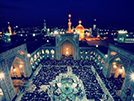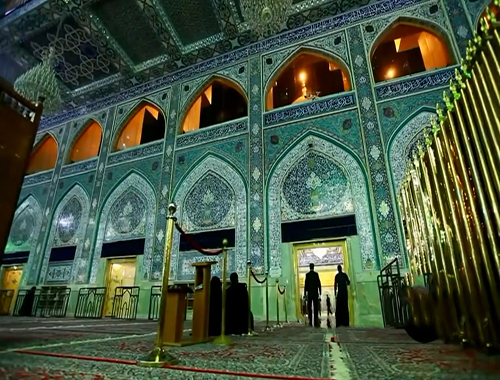Chapter Four: Theology of Plato
- Details
- Hits: 5013
Chapter Four: Theology of Plato
The matter of God and Theology are among the complicated and vague matters in Plato's philosophy regarding which, many discussions and interpretations have taken place and these interpretations too have mostly been propounded on the basis of probability.
Regarding this, Plato himself in the treatise of 'Taima'oos' says: “It is difficult finding the creator and father of the Universe and in case of discovering Him, it is impossible to talk about Him with every one.” (History of Kapilstan's Philosophy; Pg. 247)
Moreover, in the treatise of 'Jamhur' he says: “The source of goodness lies in the farthest end of the world of rational ideas and one can see that with hardship.” (Plato - Jamhur)
Before the matter of God in Plato's philosophy is discussed, it is appropriate to cast a short glance over his philosophy. Just as it was said before, Plato believed that perceptible things are in the state of 'becoming' whereas rational recognition is with regard to those things which are in the state of 'are' and the constant Universals which intellect can recognize them, are existing in a world different from the perceptible and variable world.
These Universals or parables are placed with special arrangement and in an orderly manner in the world of exemplary ideas such that the more we go up in the chain of exemplary ideas the more encompassing and Universal parables we do achieve. On top of this is placed the 'absolute goodness' which according to the statement of Aristotle is the same as 'Oneness'.
On the other hand, Plato propounds the matter of 'Creator' or 'Demurage' for explaining the relation between the perceptible world and the rational world and the manner of formation of the perceptible world. “In the treatise of Tima'oos, Plato explicitly mentions that God or the Creator makes the things of this world according to the pattern of images (exemplary ideas).” (History of Kapilstan's Philosophy; vol. 1; Pg. 234)
“It cannot be denied that Plato speaks in 'Tima'oos' in such manner that as though the Creator (Demurage) i.e. the efficient cause of regularity in the Universe makes the things of this world out of images as an exemplary cause. Thus the image or exemplary ideas are completely separated from the Creator such that if we name the Creator as God we should then conclude that the images are not only far away from the things of this world but are also away from god.” (Same source; Pg. 238)
Till here it appears that the god of Plato is the very Creator or Demurage which is separate from the exemplary ideas and absolute goodness and its work is making the perceptible world from the pattern of exemplary ideas.
On the other hand, Aristotle states that in the view of Plato, 'Oneness' is the cause of (essence) of images” (Aristotle - Metaphysics; Pg. 26)
Plato himself says in the book of Jamhur that: “I suppose that the source of goodness is having a place in the farthest end of the world of rational ideas and it can be seen with great hardship. However if a person witnesses that, then he will inevitably admit that the source of every good and beauty is the same and the creator of illumination and center of light in the perceptible world is none other than that and the source of reality and intellect in the world of rational ideas too is the same.” (Book of Jamhur 7th section; Pg. 400, 401)
“In the same way one should acknowledge that those things too which are recognizable, not only acquire the quality of recognition from the source of goodness but their existence and essence too are from goodness. This is not withstanding the fact that goodness is not exactly as existence but with respect to power and greatness, it is by many degrees higher than existence.” (Same source 6th section; Pg. 384)
As such, in the philosophy of Plato we are faced with two gods: 'Creator' and 'absolute goodness'. Plato too in his sixth letter to his friends endorses this matter. In that letter he asks his friends “to swear faithfulness in the name of god who is the Leader of all present and future things and in the name of father of that Leader and Cause.” (History of Kapilstan's Philosophy; vol. 1; Part 1; Pg. 247)
This god and its father have been adapted to Demurage (Creator) and Absolute goodness (oneness).
Now let us see how in the view of Plato, people can recognize God. According to him, the real recognition is the very recognition of the Universals and image and the most Universal images too is Absolute goodness and Oneness which was the god of Plato and is placed on top of the image. It is to be seen as to how the recognition of image and Universals is to be acquired.
Plato narrates in detail the way of achieving the recognition of the image in the seventh book of Jamhuri: In the beginning of this book, he sets forth the famous example of the cave in the words of Socrates and then mentions that it is only the philosophers who have liberated themselves from the darkness of the cave and obtained the brightness of the sun and Absolute goodness.
Thereafter he continues and says: “A philosopher who has met Absolute goodness should come down to the territory of the captives and take over the reign of their affairs until a virtuous city is established and the people reach prosperity. However if someone wishes to become a philosopher and engage in witnessing the ideas, absolute goodness and god he should from before, pass through some stages.
The first knowledge, which Socrates[12] recommends is the knowledge of numbers and arithmatics. By means of this knowledge, the soul elevates from the environments of the transient world to the position of real perception. Concerning this, man can lead his soul to an upper world and incite it to reflect about the reality of numbers and not allow the soul to consider the numbers to be the agent of visible and perceptible things.
The second knowledge, which is recommended, is Geometry. Since the matter of geometry is an existing everlasting and subsistent knowledge it drives the soul towards the realities. Thereafter the geometry of space and stars are discussed. In this course the research moves from plane geometry to space geometry until it helps one philosopher in getting closer to the abstractional ideas through advancement from the next perusal of difficulty number two to the next perusal of difficulty number three.
The last stage in the premises of dialectic is the knowledge of voices and music. Of course, the emphasis is not on studying the voices itself but studying their relation between them. After successfully passing the above premises, a person is now worthy enough to participate in Dialectic (rational argumentation, debate and dispute) so that he is able to release himself completely from the shadows of the cave and is able to remember the rational ideas.
However, the debater should possess other qualities too which consist of: Will, courage, beauty, natural disposition, sharp-mind, memory, untiring aspirations, love towards every kind of work and physical and spiritual powers.
Of course the aged cannot pass this path because it is easier for the old to avoid rather than acquire knowledge and the difficult and heavy works should be entrusted to the young.
As such, the philosophers should learn the above teachings from childhood and till the age of eighteen they should have the primary knowledge of literature, music and mathematics. Thereafter till the age of twenty they should be given physical and military training. Then, for a period of ten years they should engage in mathematics and should by now put together those knowledge which they had learnt in a diversified manner in their childhood. At that time, the best are chosen and for five years, i.e. till the age of thirty-five, they should strive in acquiring the knowledge of debate. After that, he should spend fifteen years in acquiring methodical experiences until at the age of fifty, this selected person finally succeeds in meeting Absolute goodness. (Jamhur 7th section; Pg. 392-446)
Universal principles of Plato's Theology
The theology of Plato can be summarized in a few sentences:
1) For Plato, searching God is difficult and speaking to people about God is impossible.
2) In Plato's theology we come across two existences which in all probabilities both are god and or one is the real god and the other a secondary one just as Plato remembers them as father and son.
3) 'Ma'refat'(gnosis) is only reminiscence and rational intuition[13]) of images and intellectual ideas. This intellectual ideas or concepts become feasible through rational disputation and debate.
4) One of the two god's of Plato is placed on top of the rational ideas which is 'Oneness' and 'Absolute goodness'
5) When the other god of Plato i.e. Creator (Demurage) appears in Plato's philosophy and the relation between the two perceptible and rational worlds are propounded in an interrogatory manner and Plato sets forth the other god for solving this problem. This god i.e. Creator occupies no more a place in the chain of exemplary ideas and gets separated from Oneness and Absolute goodness.
6) The theology of Plato is in reality a philosophical theology. That is to say, Plato is capable of being imagined and perceived only within the framework of philosophical system.
7) The more abstract and universal the images the more difficult become their recognition. Therefore recognizing the Absolute goodness, which is placed on top of the rational idea and is one of the two gods of Plato, is the most difficult recognition and from the viewpoint of time too, it is reckoned to be the last recognition.
8) Both the gods of Plato, especially the Absolute goodness are capable of being recognized only by the philosophers and the philosophers are restricted people who possess physical, external, spiritual, mental and… abilities who, after passing through many stages become capable at the age of fifty of perceiving the Absolute goodness. The rest of the people i.e. the majority are deprived from perceiving god and their prosperity lies only in being obedient to the philosophers and rulers of Plato's virtuous city.
The above discussion is the result of Plato's theology. All these outcomes are against the construing of divine religions from Almighty God and the way of His recognition.
In the next section divine theology will be evaluated in detail and then its glaring difference with the above results will be revealed. We shall index-wise present here the views of divine religions especially with regard to the above discussion. Its explanation will be given later on.
1) The Ma'refat (gnosis) of God is Universal and is not exclusive for some particular people.
2) There is no knowledge, which is preliminary step towards recognition of God, and the recognition of God is not propounded in the mould of philosophical systems.
3) Recognition of God does not need philosophical and rational deliberation. Rather making the people to recognize God is the responsibility of God and so it does not involve any intellectual problem for man.
4) The fundamental pillar of divine theology is 'Tauheed' (monotheism).
5) God cannot be described and depicted in any rational and mental form. His holy presence is pure and free from any rational imagination. All the human conception about Him is an imagination, which is the outcome of the system of human mind and is not capable of being accepted in the presence of Holy God.
6) The real Ma'refat (gnosis) of God is not possible by means of Dialectic and disputation but the heart of man is the focal point of Ma'refat (gnosis) and he is the address of God's definition. Of course, one should not utilize this talk in the sense that we reject every kind of reflection and debate in the domain of religious belief. Good argumentation and disputation enjoys a special position in all the religious sciences, which shall be clarified in the future, discussion.











